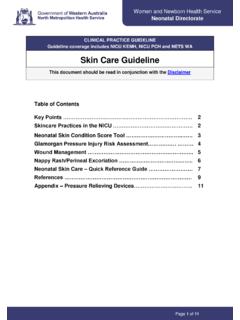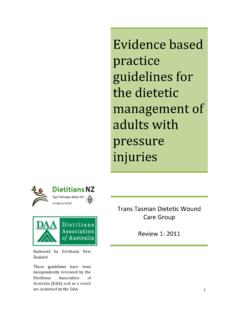Transcription of How to use this ebook - Therapeutic Guidelines
1 Contents Index Back How to use this ebook Navigation Top right corner of book Contents Takes you to the table of contents. Click on the page numbers to go to the chapter of interest. Index Takes you to the index. Click on the page numbers for the term of interest. Back Takes you to the last page you were looking at. It is like the back arrow button on an internet browser. Up arrow Takes you to the previous page. Down arrow Takes you to the next page. You can also change pages using the scroll wheel on your mouse or the Page Up and Page Down keys. Bookmarks panel to the left of book Click the plus sign (+) next to the bookmark to expand it, then click on your topic of interest. Contents Index Back How to use this ebook (cont.). Links Any text formatted like this is an active link. Most links take you to another part of the book. Some are hyperlinks that connect you to a website (a link on a reference title goes to its PubMed abstract).
2 To return to this book, click the back arrow on your internet browser. Searching the book Enter Ctrl F to open the Find function in the top right corner of the window. Request for comment on Guidelines We welcome your comments. See contact information. Contents Index Back Management Guidelines Developmental Disability Contents Index Back Available from Therapeutic Guidelines Limited (TGL): eTG complete eTG complete is TGL's core product, designed for use on computers and available online or on CD. It has the latest version of all topics published by TGL, including several that are only published electronically. eTG complete also provides references, links to other independent information and patient information sheets (for download). miniTG. miniTG is the portable (offline) version of eTG complete, for use on mobile phones and handheld devices. Print titles Therapeutic Guidelines : Analgesic Therapeutic Guidelines : Antibiotic Therapeutic Guidelines : Cardiovascular Therapeutic Guidelines : Dermatology Therapeutic Guidelines : Endocrinology Therapeutic Guidelines : Gastrointestinal Therapeutic Guidelines : Neurology Therapeutic Guidelines : Oral and Dental Therapeutic Guidelines : Palliative Care Therapeutic Guidelines : Psychotropic Therapeutic Guidelines : Respiratory Therapeutic Guidelines : Rheumatology Therapeutic Guidelines : Toxicology and Wilderness Therapeutic Guidelines : Ulcer and Wound Management Management Guidelines : Developmental Disability Contents Index Back Management Guidelines Developmental Disability Version 3, 2012.
3 Therapeutic Guidelines Limited, Melbourne Contents Index Back Copyright 2012 Therapeutic Guidelines Limited All rights reserved. Apart from any fair dealing for the purpose of private study, criticism or review as permitted under the Copyright Act 1968, no part of this publication may be reproduced, stored in a retrieval system, scanned or transmitted in any form without the permission of the copyright owner. Suggested citation: Therapeutic Guidelines Limited. Management Guidelines : developmental disability. Version 3. Melbourne: Therapeutic Guidelines Limited; 2012. First published 1999. Version 2 2005. Version 3 2012. Publisher and distributor: Therapeutic Guidelines Limited Ground Floor, 473 Victoria Street West Melbourne, Victoria 3003. Australia Telephone +61 3 9329 1566. Telephone 1800 061 260 (within Australia). Facsimile +61 3 9326 5632. Email Website < >. ISBN 978-0-9808253-5-0. Contents Index Back Contents How to use this ebook ii Tables and boxes x How Management Guidelines : Developmental Disability, version 3 was prepared xii Contributors xiv Acknowledgments xviii Endorsements xx Board of directors of TGL xxi Chapters Management Guidelines : Developmental Disability Developmental disability and health care 1.
4 The doctor as advocate 10. Communicating with a person with developmental disability 15. General practice consultation 29. Legal concerns 38. Informing parents of their child's disability 50. Assessing developmental delay and disability 57. Managing a child with developmental disability 70. Managing an adolescent with developmental disability 79. Adult health care 95. Aged care 112. Women's health 130. Men's health 142. viii Contents Index Back Preventive health care and health promotion 145. Challenging behaviour: assessment and management 148. Challenging behaviour: drugs 165. Psychiatric disorders: assessment 175. Psychiatric disorders: management 187. Epilepsy and seizures 210. Nutritional disorders 220. Dysphagia 230. Oral health 240. Sexual expression 244. Angelman syndrome 250. Autism spectrum disorder 255. Cerebral palsy 266. Management Guidelines : Developmental Disability Down syndrome 283. Fetal alcohol syndrome 295.
5 Fragile X syndrome 301. Neurofibromatosis type 1 314. Noonan syndrome 321. Prader-Willi syndrome 326. Rett syndrome 338. Tuberous sclerosis 344. Williams syndrome 350. Disability resources 355. Appendices Index 364. Request for comment on Guidelines 374. ix Contents Index Back Tables and boxes Tables Table 1. Causes of developmental disability 60. Table 2. Normal development in children 61. Table 3. Manifestations of developmental delay 62. Table 4. Features of history when establishing cause and developmental pattern of a disability 64. Table 5. Useful referrals when assessing developmental delay and disability 67. Table 6. Interventions to minimise developmental problems 72. Table 7. Checklist of health and social concerns in an Management Guidelines : Developmental Disability adolescent with developmental disability 81. Table 8. Pubertal disorders associated with developmental disability or other conditions 84.
6 Table 9. Health care checklist for an adult with developmental disability 97. Table 10. Differential diagnosis of functional decline in Down syndrome 121. Table 11. Checklist for assessing and managing challenging behaviour 153. Table 12. Questions to guide a history of challenging behaviour 155. Table 13. Individualised data sheet for monitoring challenging behaviour (example) 159. Table 14. Risk factors for psychiatric disorder in people with developmental disability 176. x Contents Index Back Table 15. Observable features of depression in people with developmental disability 182. Table 16. Observable features of hypomania and mania in people with developmental disability 184. Table 17. Clinical characteristics of Angelman syndrome 252. Table 18. Recommended health monitoring for children with Down syndrome 292. Table 19. Diagnosis of tuberous sclerosis 345. Boxes Box 1. Information needed when assessing a person with developmental disability 33.
7 Box 2. Common conditions in older people with developmental disability 115. Box 3. Questions before prescribing psychotropic drugs Management Guidelines : Developmental Disability to manage challenging behaviour 166. Box 4. Investigations to consider in psychiatric assessment of a person with developmental disability 177. Box 5. Obtaining collateral information in psychiatric assessment of a person with developmental disability 178. Box 6. History of presenting complaint in psychiatric assessment of a person with developmental disability 179. Box 7. Key points when using psychotropic drugs in a person with developmental disability 192. Box 8. Indicators of Lennox Gastaut syndrome 213. Box 9. Decision-making framework for assessing and managing a person with dysphagia 238. xi Contents Index Back How Management Guidelines : Developmental Disability, version 3 was prepared Management Guidelines : Developmental Disability, version 3.
8 (DDG3) has been prepared in a different way from other Therapeutic Guidelines Limited (TGL) titles (see eTG complete for a description of that process). A TGL editor, Dr Susie Rogers, was responsible for managing this project and editing the book. Management Guidelines : Developmental Disability Professor Nick Lennox, from the Queensland Centre for Intellectual and Developmental Disability, was a consultant. At the start of the project he gave advice on appropriate reviewers for each chapter in the book. During the project he answered questions specific to developmental disability from TGL staff. The Medical Advisor at TGL, Professor Robert Moulds, and the Editorial Director, Ms Jenny Johnstone, held regular meetings with Dr Rogers to discuss progress and resolve any problems that arose. At the start of this project, Dr Rogers edited each chapter to make DDG3 more concise and minimise duplication between chapters.
9 She did not review the content. Each of the 36 chapters in the book was reviewed by an expert on that topic. Some chapters had two reviewers who worked together. Twenty-nine experts contributed. Many chapters had different reviewers from the last version of the book (DDG2), which was published in 2005. xii Contents Index Back Reviewers were asked to bring the chapter content up to date, to provide references to support their changes, and to focus on what information would be most helpful to a general practitioner. TGL decided that when treatment of a person with developmental disability was the same as for a person without disability, the reader would be directed to eTG complete. this means the reader always has the most up-to-date advice on that topic. In a collaboration between the relevant expert and Dr Rogers, each chapter was reviewed and re-edited at least twice (usually several times). At the end of this process, all reviewers were sent the draft manuscript for comment.
10 Decisions on whether to incorporate reviewers' comments in the final manuscript were made by TGL staff in consultation with Professor Lennox. Relevant peak organisations and centres were invited to endorse the manuscript. Management Guidelines : Developmental Disability xiii Contents Index Back Contributors Professor Nick Lennox (contributor and expert advisor). Queensland Centre for Intellectual and Developmental Disability, School of Medicine, The University of Queensland, Brisbane, Queensland Dr Helen Boocock Director, Oral Health, Clinical Education & Training Queensland, Brisbane, Queensland Winthrop Research Professor Carol Bower Telethon Institute for Child Health Research, Centre for Child Health Research, The University of Western Australia, West Perth, Western Australia Management Guidelines : Developmental Disability Dr Mary Burbidge Clinical Director (retired July 2012), Centre for Developmental Disability Health Victoria, Monash University, Notting Hill, Victoria Dr Jonathan Cohen Fragile X Alliance Inc, North Caulfield, Victoria Adjunct Senior Research Fellow, Centre for Developmental Disability Health Victoria, Monash University, Notting Hill, Victoria Dr Ivana Dojcinov Specialist trainee in psychiatry of intellectual disabilities, Welsh Centre for Learning Disabilities, Cardiff University, Cardiff, Wales, UK.




